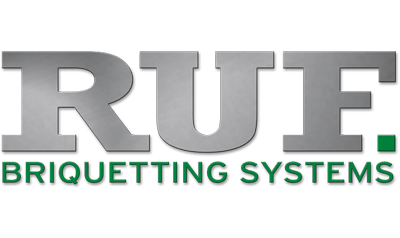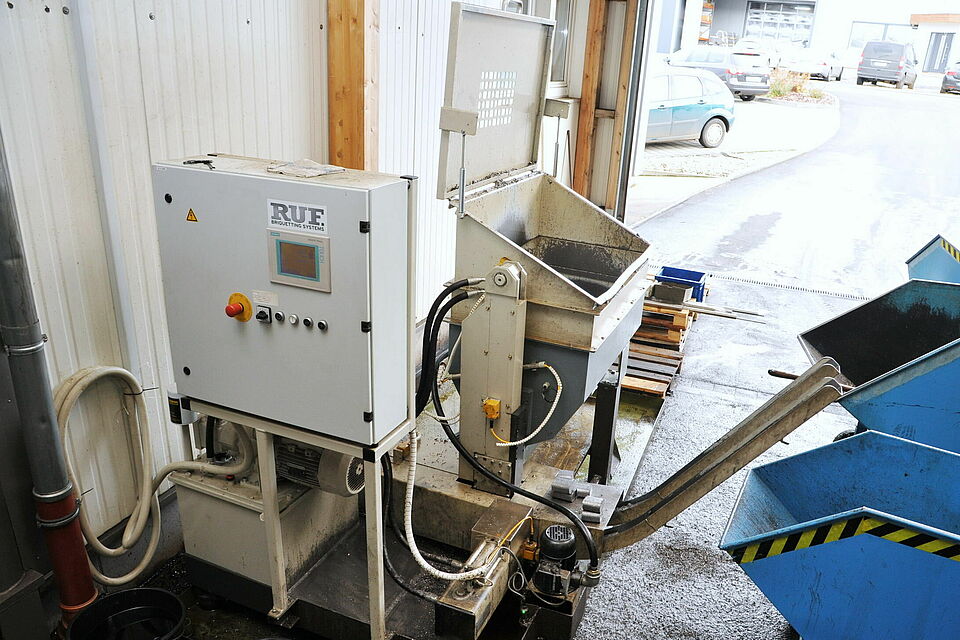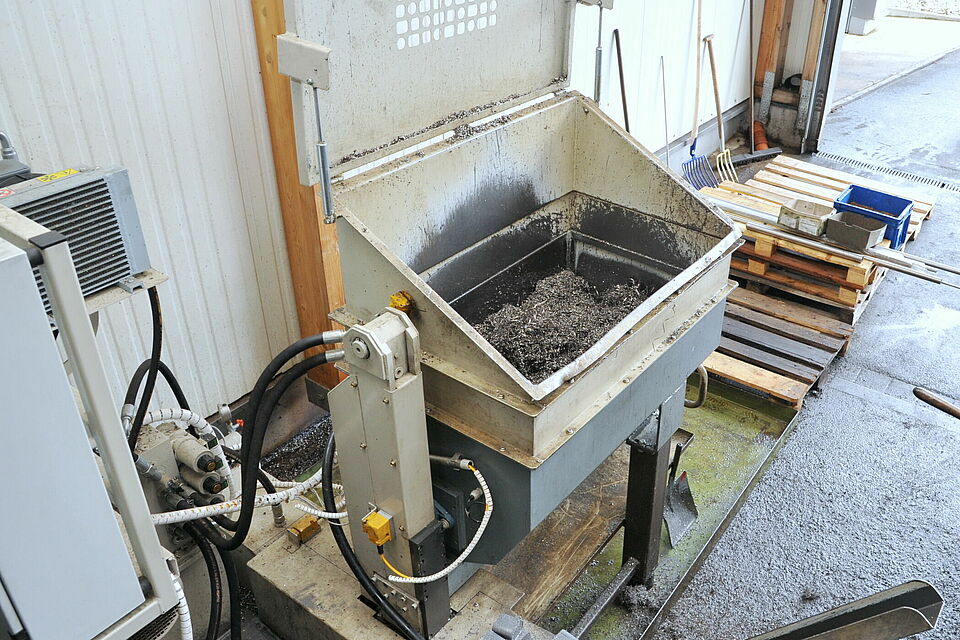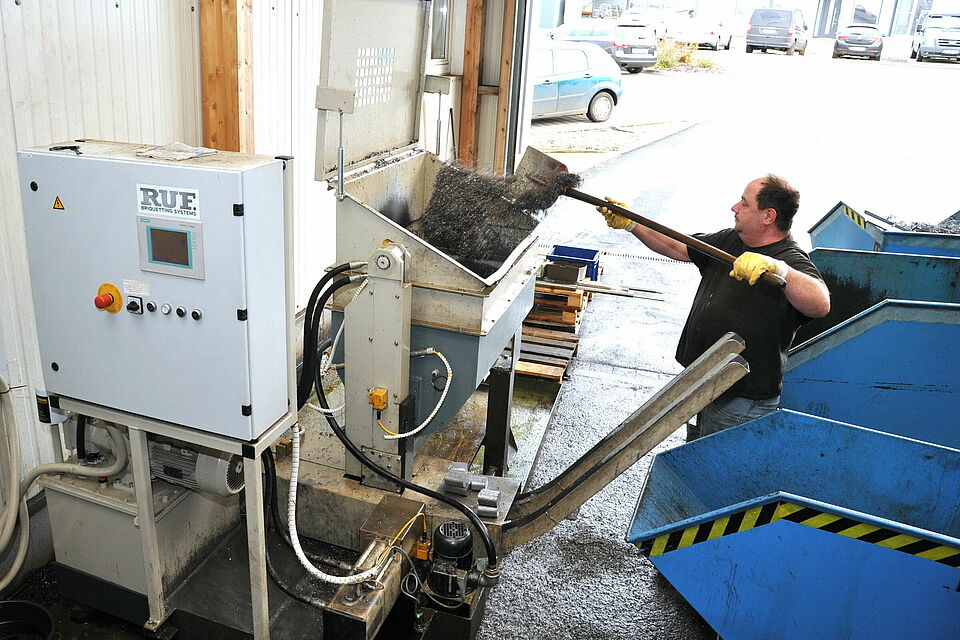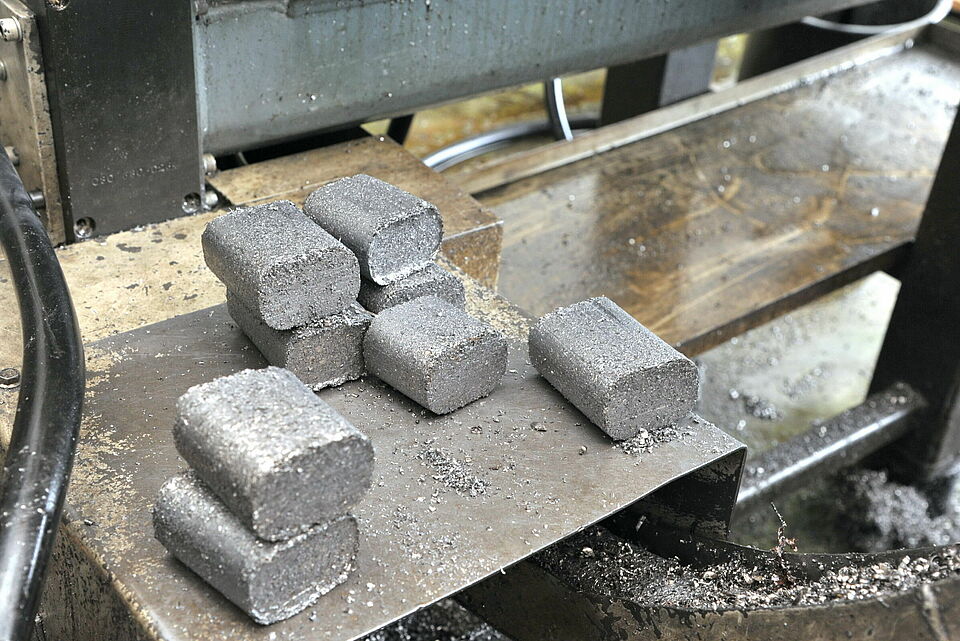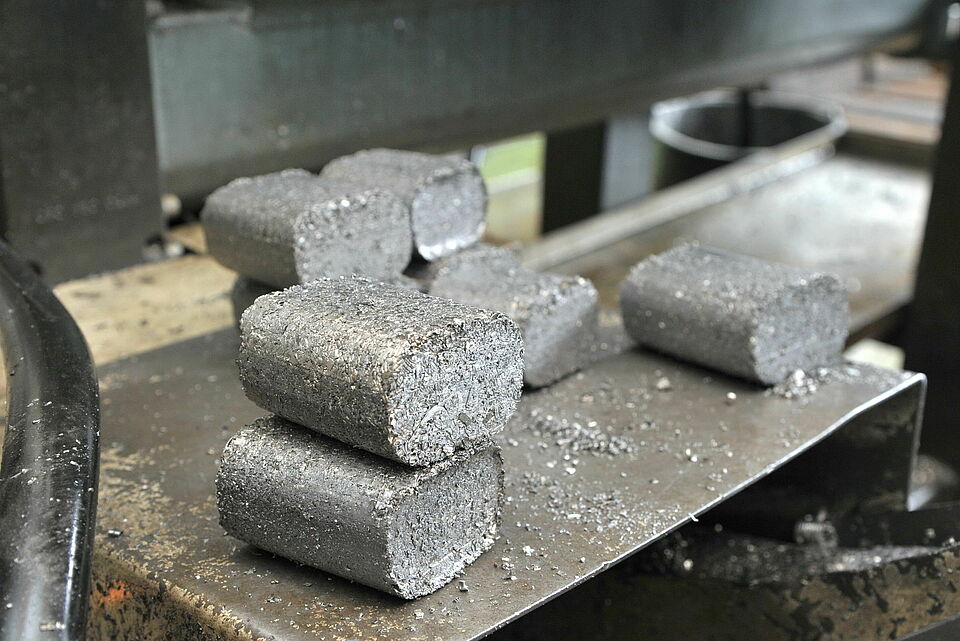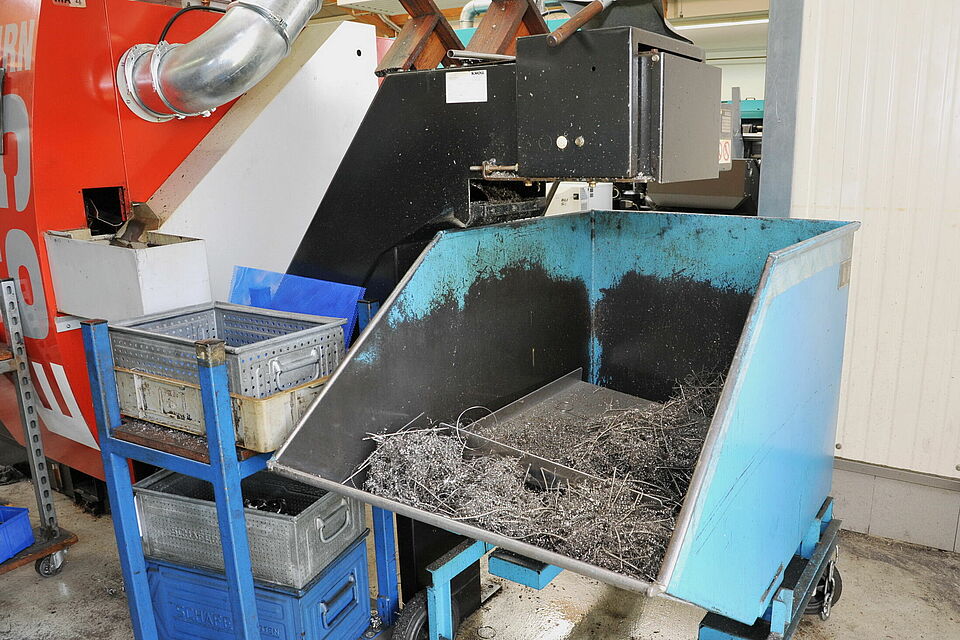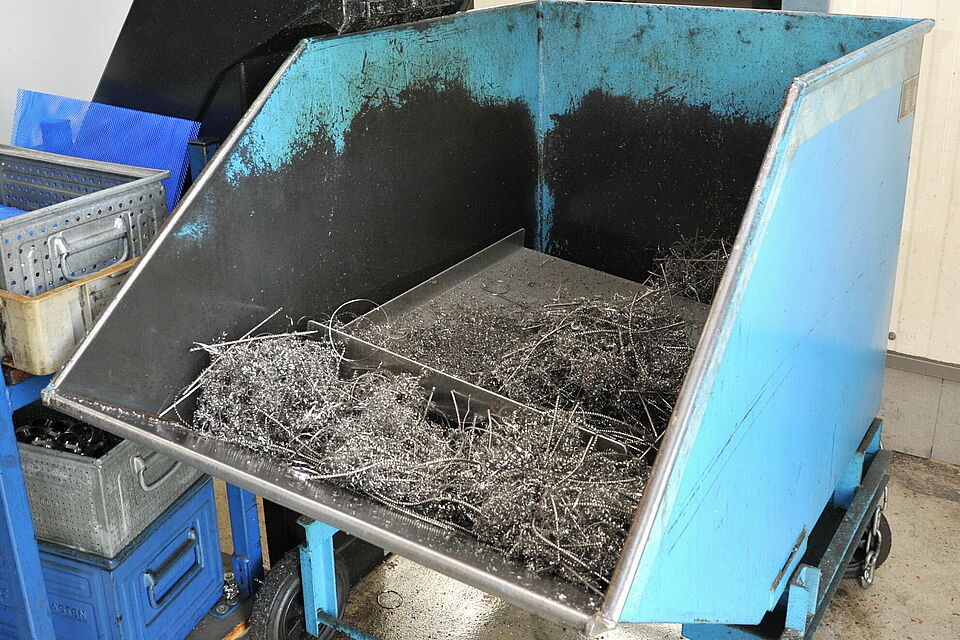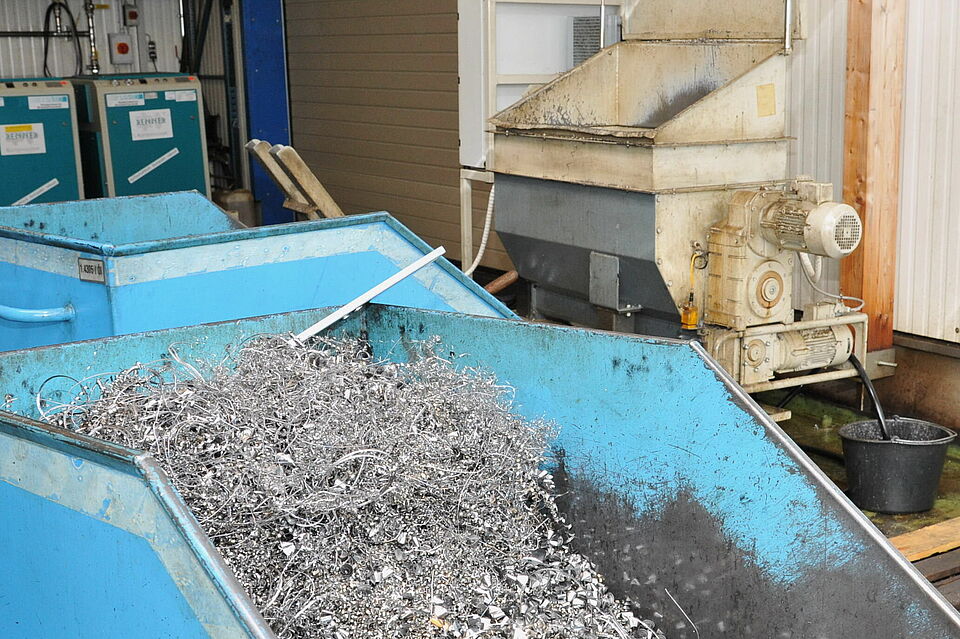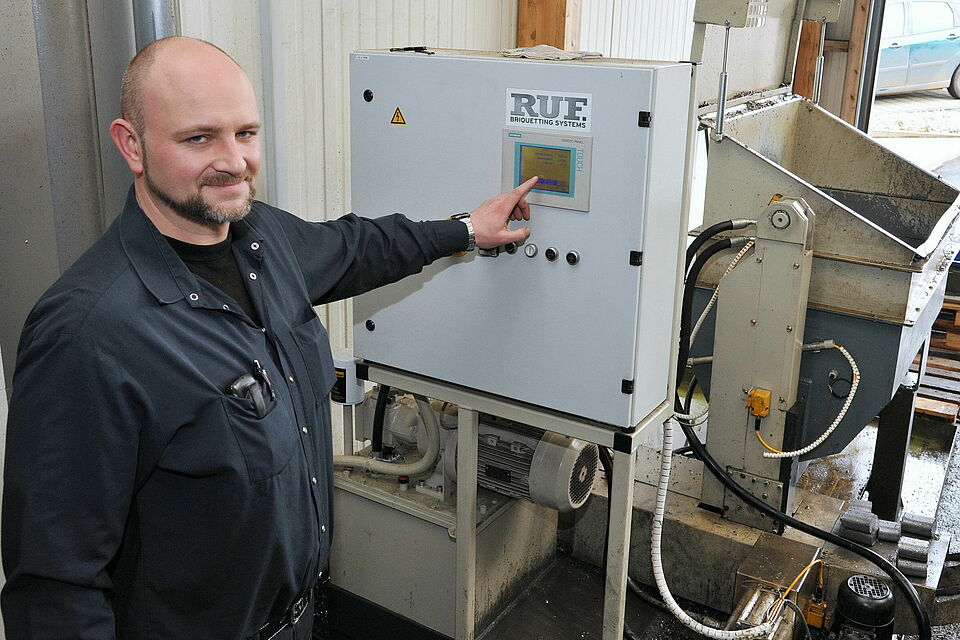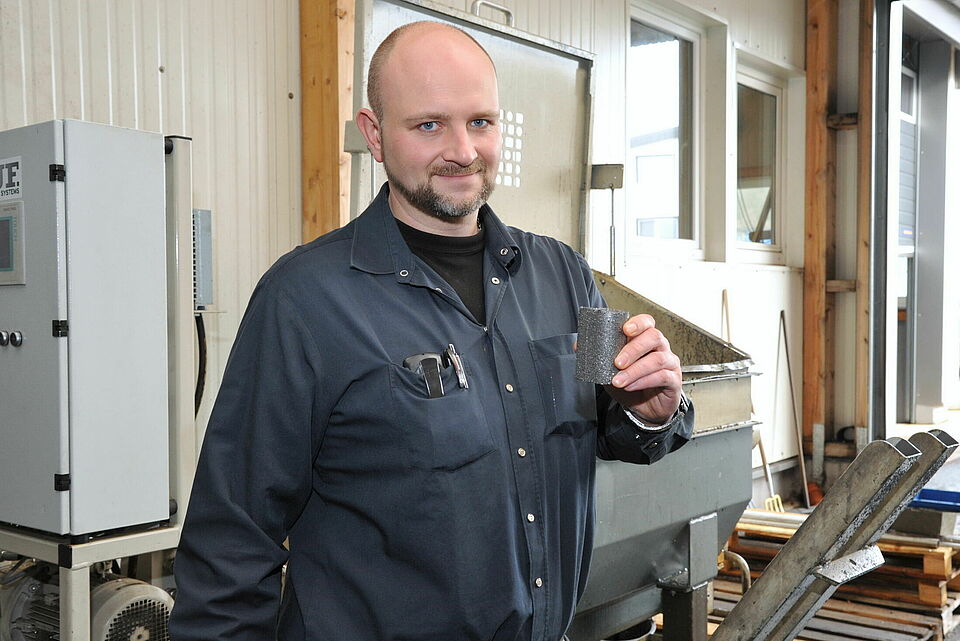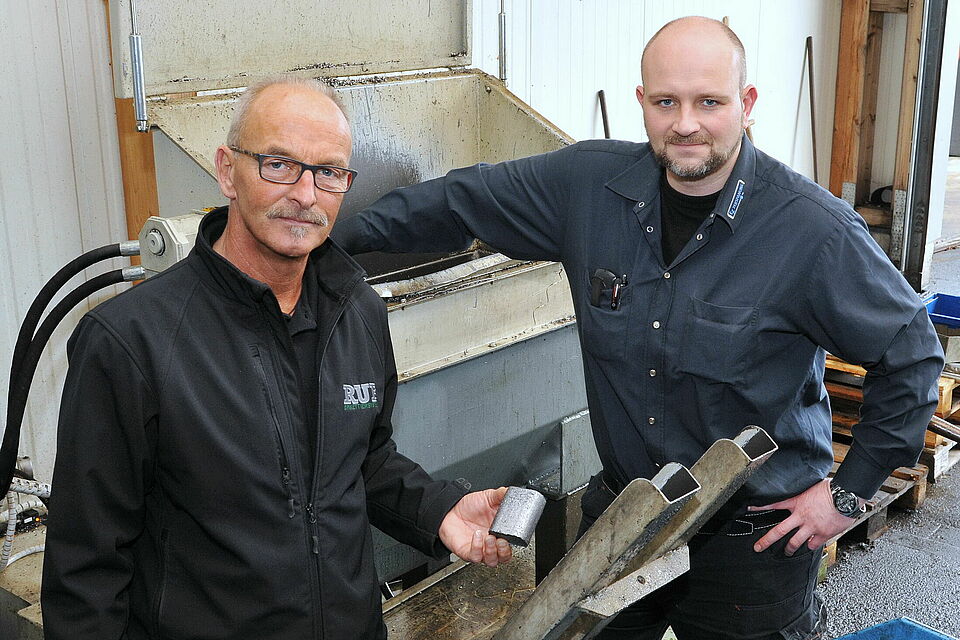Loss of cutting oil minimised with briquetting Turning parts producer retrieves 80 percent of the lubricant from production residues
By pressing loose chips of stainless steel into briquettes, EZ Zerspanung GmbH was able to lower its costs for cutting oils significantly and reduce environmental impact. Through the process of briquetting the turning parts expert can retrieve about 80 percent of the cutting oil adhering to the chips. This saving is the main reason why the RUF-briquetting press amortised itself within less than three years.
(Kopie 4)
EZ Zerspanung GmbH has grown quite rapidly. In 2006 Bernhard Heil started off with a sawing machine with which he produced stainless steel pipes to make handrails. Shortly afterwards the trained toolmaker bought his first lathe to be able to take on more extensive orders. Today his company owns a plant in Mittelkalbach, eastern Hessen, with around 20 machining centres, mainly different kinds of lathes.
The core business of the 17 co-workers is still in the stair manufacturing sector. EZ Zerspanung primarily produces stainless steel turning parts like wall bolts, handrails, handrail supports and end caps for its sister company MWB Vertrieb GmbH, which has a good reputation as a supplier for stair manufacturers in Germany and neighbouring countries. Other customer sectors include the automobile and filter industry.
The briquetting technology was introduced in EZ Zerspanung after their lathes and saws were converted to run with cutting oil instead of cooling lubricant emulsions. Alexander Fröhlich, production manager, reports: “Instead of the relatively cheap costs for the emulsions, we had to now pay about 25,000 euros per year for the cutting oil.” Part of it already gets retrieved in the manufacturing machines and is reused but a lot of it sticks to the chips. The scrap dealer had to accept these stainless steel chips with its adhering oil residues but it was a bad deal for both parties because EZ Zerspanung lost valuable oil and for the scrap dealer the oil was problem waste, which lowered the chips’ value.
Cutting oil gets pressed out of the chips
In 2013 company owner Bernhard Heil and Alexander Fröhlich found their solution at the METAV trade fare in Düsseldorf in the form of RUF’s briquetting technology. Heil was instantly convinced by the machines. Only a few months after consultation meetings and press tests with original chips at RUF in Zaisertshofen, a press type RUF 4/3700/60x40 was installed at EZ Zerspanung. The 4 kW electrical drive motor presses the steel chips with a specific pressure of 3,700 kg/cm². The briquettes have a cross section area of 60x40 mm. The height varies between 60 and 100mm depending on the type of chips.
The main advantage for EZ Zerspanung is the separation of stainless steel and cutting oil. During the pressing process the oil gets pressed out almost completely and is collected. The adhesive cutting oil makes up about 13 percent per weight of the chips. By briquetting them, the oil percentage in the briquette is lowered to a maximum of three percent.
The oil gets collected in a pan of the briquetting system and is then pumped into the adjoining container with a cooling lubricant pump. “After that we filter the oil to get rid of suspended solids and feed it back into the machines. At a price of two euros per litre we can make significant savings this way”, Fröhlich explains. EZ Zerspanung presses a total of 70 tons of chips into briquettes every year. Chips with emulsions instead of oil clinging to them after the production do not get pressed into briquettes.
Dry and compact instead of wet and bulky
Apart from retrieving its cutting oil, the company also benefits from the massive volume reduction achieved through the pressing process. “The scrap dealer used to pick up a 15 cubic metre container full of chips every four to five days. The transportation costs alone were several hundred euros every month”, Fröhlich reports. Due to the massive compression only a fraction of the transports are now necessary. Whereas the usual rate of volume reduction with millings is between 1:4 and 1:6, it can reach rates of up to 1:10 with long turnings. Mainly due to the retrieval of cutting oil, but also the reduction of transportation costs, the amortisation span of their investment in the RUF-unit was less than three years for EZ Zerspanung, even though the press is far from used to capacity.
All RUF presses are designed for 24 hour automatic use. Level sensors detect when the hopper is filled with sufficient chips and start the machine automatically. The finished briquettes are then transported with two output rails into collection containers, which are in position. If the chip hopper is empty the machine will work on for a few cycles to also empty the pressing cylinder and will then automatically stop. If the chips are filled into the chip hopper using for instance a conveyor device, then the only manual task that remains is exchanging full briquette containers with empty ones.
EZ Zerspanung is currently not using the extensive automation functions because the chips of the three main materials V2A, V4A and machining steel are collected, correctly sorted and pressed accordingly. With around 20 machines, which process changing materials, correctly sorted and automated filling of the briquetting press would not be profitable. The chips are therefore collected in containers with a capacity of about 600 litres next to the machines.
Briquetting is environmentally friendly
At EZ Zerspanung the hopper of the briquetting unit is filled manually to a large extent. Either an employee shovels the chips from the collection container into the hopper or a forklift empties the collection container directly into the hopper. The unit can be adjusted to nine different types of chips. For long chips with a low bulk density the cycle time of the feeder screw of the pre-charger is increased. This ensures that even with varying bulk volume of the chips, more or less the same amount of chip material is compressed into a briquette.
After almost three years the project has turned out positively. “We are very satisfied with the machine, it works very reliably”, Alexander Fröhlich summarises. Very little maintenance work is needed. Alexander Fröhlich’s workers fulfill the required tasks themselves. This takes up about two man hours every week. Once a year about one workday is required for checking the most important machine components and changing the hydraulic oil.
For EZ Zerspanung GmbH investing into briquetting had environmental aspects too. “By retrieving cutting oils and briquetting the chips we contribute to the environmentally friendly extraction of secondary raw material”, Fröhlich emphasises. Sooner or later, Fröhlich assumes, it will be prohibited to a large extent to dispose of “wet“ chips. In Bavaria and Baden-Württemberg a regulation which states that chips with clinging oil or cooling lubricants can only be disposed of after a chip treatment already exists.
EZ Zerspanung GmbH …
… is an owner-managed company with 17 employees, which is specialised in producing stainless steel turning parts. About 20 different machines are at disposal for the production of the high-end turning parts, from conventional and cycle controlled lathes and milling machines, CNC single-spindle lathes and longitudinal lathes to turn-mill centers and multi-spindle machines. Pieces with a diameter of between six and 300 millimeters are produced. These contain individual and custom parts as well as small and big series. With its wide range of lathes EZ Zerspanung can fulfill a wide variety of processing needs.

